
The apartment complex in Dnipro where a Russian strike killed 46 people in January, shown last week.
12:11 JST, June 6, 2023
PIDHORODNE, Ukraine – Natalia Hafykina, 60, was so close to her next-door neighbors, Vladislav and Natalya Prykhodko, that they celebrated the young couple’s pregnancy together and then, just over one year ago, the birth of their daughter, Liza.
Until now, their small, suburban town, seven miles north of the bustling city of Dnipro, had been peaceful. But on Saturday night, a Russian missile struck their two-story apartment building, cracking slabs of concrete and shattering walls and windows.
The blast left little Liza dead under the rubble and her mother in an intensive care ward. When Vladislav Prykhodko briefly came home from the hospital on Sunday, Hafykina could not bear to speak to him.
“He looked so vulnerable that I couldn’t go up to him – there were no words,” she said, standing amid splintered furniture as her son and his friends nailed plywood over her shattered windows. “We were a family. This was our community. We never worried about danger,” Hafykina said. “Now I too am scared. Suddenly everything feels different.”
The strike in Pidhorodne, which injured 22 people including five children, was the second attack in just over a week in the Dnipro area.
On May 26, a medical clinic specializing in psychological disorders was hit by two missiles, leaving the old stone building in ruins, four people dead and 32 injured. An adjacent veterinary clinic burned to the ground, though all staff members and animals escaped harm.
The back-to-back strikes in greater Dnipro, a city in central Ukraine that often feels far from the front lines, came as a disconcerting reminder that there is no escaping Russia’s brutal war and that Moscow’s relentless barrage of missiles can deliver death and destruction at any moment.
Dnipro, about 80 miles from the southern front in Zaporizhzhia and roughly twice that distance from the eastern front in the Donbas region, suffered one of the war’s worst individual attacks in January when a missile hit a high-rise apartment complex, killing 46 people and wounding 80.
Since then, the city had suffered about one or two attacks per month – enough to keep residents on edge but infrequent enough to allow a semblance of normalcy, especially with the arrival of warm weather.
These days, outdoor cafes are filled, and sidewalks are crowded with people pushing strollers and walking dogs. At a riverside park on Friday, hundreds flocked to a lively children’s festival that featured waterslides and wading fountains.

Children play at a riverside park in Dnipro last week.
But amid the shrieks of laughter, many parents and other adults watching the fun said the day provided a rare, welcome relief from the less visible burdens they carry as the 15-month-old war drags on.
Some said they had lost jobs and were struggling financially. Others said they had made dangerous escapes from Russian-occupied areas and worried constantly about relatives fighting on the front lines.
Maxim Yushko, 42, a lawyer, grinned with delight as he played with his baby daughter next to a fountain. He said his family had been resettled comfortably here by aid groups after fleeing their native Luhansk region, but they still dream of returning home. He is also dogged by concern about his brother and nephew, who are fighting in the war.
Lidia Zhuko, 66, who was sitting on a park bench with a small dog in her lap, said that she had lost her job in retail sales as the war reduced consumer spending, and that her nephew in the army had been hospitalized three times, then sent back to duty.
“For me, coming here is a way to create a positive moment in a time when so much is uncertain,” Zhuko said. “It puts me in a good mood and allows me to appreciate being alive and safe.”
At the site of the medical clinic strike, administrators were busy rerouting patients elsewhere Friday. Natalya Grizhny, the director, said two doctors had been blinded and a third hospitalized after being crushed by rubble. She said 15 patients attending a therapy session when the bombs hit were all safely evacuated.
Artem Nazara, an assistant at the next-door veterinary clinic, said he and other staffers barely managed to rescue the seven dogs and cats that were there that morning.
Most were pulled out of boarding cages, he said, but one was rushed outside from an operating table, where it was undergoing surgery for a shrapnel wound from a previous attack.
“Animals have no role in this war and no opinions about Russia, but they can still suffer as a result,” he said. “The smell of burning was strong, but thank God we were able to get them all out and none were burned.”
The site of the deadly apartment attack in January continues to draw visitors every day.
Some stand and stare for a few moments, then move on. Some cross the street to a bus stop bench, which has become a shrine to the victims. A small mountain of stuffed bears, rabbits, elephants and other animals rests there. Candles have melted into the ground, and a photo of two victims stands in the middle, with a tiny religious image and a prayer tucked into the frame.

A bus stop that is now also a shrine to the victims of Russia’s strike in January.
One visitor this week, Dmytro Baranov, 37, stood for a long moment contemplating the ruins. Baranov, a coal miner and father of three, said he had received an exemption from military service because of his essential industrial work. He spends his free time, though, writing poems and songs to boost the morale of friends in the army.
Baranov recited one poem on the spot, which he said he had written for a younger friend who served in the Azov Brigade and is a prisoner of war. Such captives, he said, need moral support as much as fighters still in battle.
“Return here, the birds are missing you,” he said. “They will not fly south until you return. They will wait on the rooftops, and when you return, they will fly again.”

Darya Birukova, a teacher and mother of two, looks at the battle-scarred apartment complex in Dnipro during a picnic with her neighbors last week.
In the playground area behind the building that was struck in January, a group of families held a picnic on Thursday for the first time since the attack. They said they had recently repaired the damaged swings so their children could play there again.
“It was hard to come back to a graveyard site, but we wanted to try to revive the spirit of the community,” said Darya Birukova, 37, a teacher and mother of two, as neighbors served pizza and salad on paper plates. She also said that having her own children help clean their toys and other belongings, which had been smothered in debris, was “therapeutic for all of us.”
One city resident, Mikhail Karpenko, 36, said he often stops by the ruined Dnipro apartment building to pay his respects. But on Sunday, he drove to Pidhorodne, too, because he wanted to honor the victims.
Standing against a fence a few yards from the site, he clutched a bouquet of roses and wiped tears from his eyes. “I didn’t know the family of the little girl, but you don’t need to know them to feel the loss,” Karpenko said.
Top Articles in News Services
-

Survey Shows False Election Info Perceived as True
-

Hong Kong Ex-Publisher Jimmy Lai’s Sentence Raises International Outcry as China Defends It
-

Japan’s Nikkei Stock Average Touches 58,000 as Yen, Jgbs Rally on Election Fallout (UPDATE 1)
-

Japan’s Nikkei Stock Average Falls as US-Iran Tensions Unsettle Investors (UPDATE 1)
-

Trump Names Former Federal Reserve Governor Warsh as the Next Fed Chair, Replacing Powell
JN ACCESS RANKING
-

Producer Behind Pop Group XG Arrested for Cocaine Possession
-

Japan PM Takaichi’s Cabinet Resigns en Masse
-

Man Infected with Measles Reportedly Dined at Restaurant in Tokyo Station
-

Israeli Ambassador to Japan Speaks about Japan’s Role in the Reconstruction of Gaza
-

Videos Plagiarized, Reposted with False Subtitles Claiming ‘Ryukyu Belongs to China’; Anti-China False Information Also Posted in Japan
























